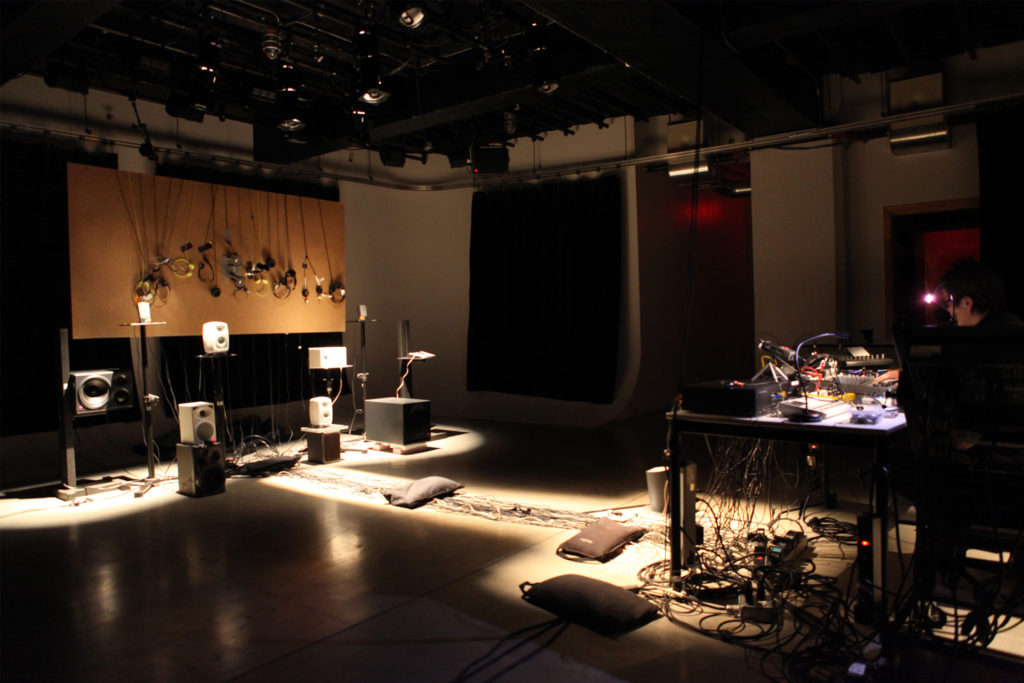Érick d’Orion Stéphane Claude Audio Art / Recent Investigations and Becoming of Sound Art 01

OBORO, 2013
In this workshop, we will look at recent history, current trends and particularly at the potential future of sound art.
What happens to sound art (https://en.wikipedia.org/wiki/Sound_art), audio art and sound installation? What happens to their relationship with acoustics, audiences and technologies? What is the effect and scope of the sound artworks presented in the exhibition space, in the natural or industrial liminal spaces and contexts of electronic art festivals?
Audio art has many listed practices, and new avenues are emerging. Each milieu has its specific culture and practices: the underground, electronic music communities, university research. There is also a wide array of aesthetics in sound creation: noise, minimalist, maximalist, etc. The ways of doing things are also varied: installation, ephemeral gestures, DIY and collaborative practices, network … This proliferation of approaches deserves to be studied according to three orientations: the recent past which informs the present of the approaches to creation, which can induce new avenues for reflection and action in the future.
Guests from different perspectives and approaches will be invited to lead some sessions:
– Philippe-Aubert Gauthier, sound and new media artist, musician, junior mechanical engineer M. Sc. Ph.D in acoustic and researcher (February 7, 2019)
– Hélène Prévost, sound artist, musician and radio broadcasting director (February 6, 2019)
– Alexandre St-Onge, sound artist, musician/improviser (bass guitar, vocals and electronics) and sound performer (February 13, 2019)
– Anne-Françoise Jacques, sound and performance artist
These sessions will be accompanied by bibliographies and links prepared by the guests as well as a selection of audio works to listen in a fitted listening room.
Emphasis will be placed on the following themes:
• What are the main actants (individuals and technologies) of audio art?
• The singularity of approaches from different countries in time, non-eurocentric visions, university research, the contribution of women, indigenous practices, the inventions of the underground.
• What are the effects on the audiences?
• How can sound art stay connected to bodily senses without visual support?
• Sound art puts us in touch with the environment and ecology through the physics of sound.
We will explore acoustic applications and transductions between physiology and electronics in sound art.
> The workshop will be offered in French, both instructors are bilingual and can answer questions in English.
Prerequisites
– Be a professional artist, creator or cultural worker;
– Have an experience working with Sound Art is an asset;
– Be a self-employed worker or a salaried employee in an enterprise not subject to 1 % Training Investment*;
– Attend every workshop session.
Number of participants: maximum 12
Registration period: Tuesday to Friday, from January 9 to January 29, 2019
Call or email the New Media Lab: 514-844-3250, ext. 230 or lab@oboro.net.
Cost: $100 (taxes included)
*NEW! Two spots are now available for employees of companies that are subject to the 1% Law. Please contact us for more details.
POLICY
Reservation / Payment
Reservations can be done by phone or email. Full payment must be made for reservations to be valid. You can pay by credit card (Visa or MasterCard), cheque or in cash. Registration to a workshop is not transferable.
Cancellation / Refund
OBORO does not refund registration fees except in case of illness (with a medical note) or of absolute necessity. In such cases, registration fees are transferable to another workshop or service offered by the New Media Lab.
Workshop Cancellation
OBORO reserves the right to cancel workshops at any time and without advance notice. In this case, registration fees are completely refunded.

OBORO, 2013
Érick d’Orion (b.1975) is a curator, sound and new media artist as well as a self-taught composer and musician, based in Montreal since 2015 and previously from Quebec City since 1993. Most of his work with sound focuses on digital maximizing and is closely related to noise, musique concrète, free jazz and electro-acoustic music.
Stéphane Claude is an electronic_acoustic composer and sound engineer. His research is based on integrating a conceptual and physiological framework of audio recording and sound installation for different diffusion contexts in the electronic arts.
